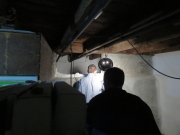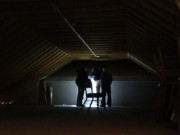
As you know, the Town Hall building includes the Town’s administration and archives, the Library, the Food Pantry, the Beacon offices, and the Town’s cable TV station. A warrant article at Town Meeting in March will ask voters to apply reserve funds to a high-efficiency upgrade to the building’s heating, ventilation, and air conditioning (HVAC).
A second warrant article will ask for solar generation for the building at the lowest investment cost for the Town – solar would be installed on the roof at initially no cost. The Town would enter into a Power Purchase Agreement at competitive rates, and then from the seventh year of the agreement the Town would have the option to purchase the solar system for its then discounted value (typically around half the original installed cost), or to stay with the negotiated rate schedule.

The amounts for the HVAC installation and the dedicated reserve for the solar buyout in seven years will be finalized in the days ahead, set out in the warrant articles and explained in the next issue of the Beacon. The sum of the costs of these two projects is expected to be approximately $46,000.
The funds for both of these warrant articles will come from existing reserves, so no new taxes will be needed. The expected net result will be a reduction in the use of oil by the building, a fixed electricity cost for a good part of the building’s needs for the next seven years, and, after that period, the option for ownership of the system.
The HVAC upgrade is part of the Capital Improvement Plan Committee’s approved plan (with the solar now included within the budget set for the HVAC alone). Both upgrades are endorsed by the Select Board. Both are key steps in an exciting project to put our Town Offices and Library on a more secure energy footing, improve the working environment for our Town and Library and Beacon staff and for all of us who visit and work in the building, and save money for years to come.
Here’s the full story:
The Andover Energy Group (AEG) is a volunteer group of Andover community members, founded over five years ago for the purpose of increasing our local energy independence and protecting our environment. Besides sponsoring many informational programs, the AEG spearheaded Andover’s participation in the successful Solarize Kearsarge effort two years ago. Solarize Kearsarge brought in a solar provider that offered a group discount to Andover residents who purchased a solar installation within a specified time. This initiative led to our town being sixth in the state for new solar installations that year!

The AEG has been working to find ways to improve the energy efficiency of the Town’s buildings and save the Town money. The logical place to start was our historic Town Hall building, constructed in 1885 and expanded in 2001. The building is one of the centers of our town, touching all our lives.
The AEG’s idea was to “adopt” it and work with the Town to reduce its energy use as much as possible, while improving comfort and saving money. Ideally, with solar, we wanted to approach “net zero,” which means the building itself will generate as much as possible of the energy it consumes. If we succeed, the Town Hall will become a model that all of us can learn from and be proud of, as well as a template for improvement of other Town buildings.
To kick off the effort, in 2011 the AEG secured a grant for an energy audit of the complete Town Hall. An expert analysis, performed at no cost to the Town, set out four categories for improvement: (1) seal and insulate to reduce energy losses, (2) improve lighting and appliances to reduce energy consumption, (3) upgrade the HVAC, and (4) put in solar.
Following the guidance of this energy audit, here’s what we’ve done so far:
Under category (1) – sealing and insulating: AEG volunteers worked with Town staff to clean and consolidate the library basement. This exposed the walls so they could be pointed and insulated. Leaks in the foundation were stopped, and the wall surface was painted to eliminate dust. A section of floor that was exposed dirt, a source of unwelcome humidity, was sealed off.
In addition, the old bomb shelter (“the vault”) in the basement that housed Town maps and archives but suffered from mildew was cleaned, sealed, and insulated. Finally, gaps in attic sealing and insulation were closed up, and windows and doors were weather sealed.
The insulation and sealing work was performed by Shakes to Shingles, based in Concord, and the masonry by Michael Hale from Newport. In addition, several AEG members, at their own expense, insulated exposed hot water heat pipes in the basement to reduce heat losses.
The results have been so far very exciting: Tests measuring the amount of air leakage in the building before and after the work showed a 29% improvement! The basement is now a clean, fully usable space. The air quality of the entire building is noticeably better. Town staff already report that they feel warmer this winter.
The work done just in this category will save the Town $948 per year. The New Hampshire Electric Co-op provided a 35% rebate on the work. With the rebate, the net cost of the insulation and sealing work amounted to only $3,123, making for a 3.3-year payback of the cost and a projected 20-year savings for the Town of over $16,000!
Under category (2) – reducing electrical consumption: AEG members worked with Town office staff to eliminate fluorescent tubes that were generating excess light. We now have in hand a proposal to replace all the building lighting with LEDs, which last for 15 years on average. This will qualify for a 50% rebate from the New Hampshire Electric Co-op and pay for itself in less than five years, saving an estimated $450 annually for the life of the LEDs.
In addition, an AEG member, at his own expense, replaced the storage tank hot water heater that was using electricity all the time with a super-efficient electric “on-demand” water heater that heats water only as it is used.
With the building’s envelope tightened and electrical consumption being reduced under categories (1) and (2), we are now able to address the largest energy use – the HVAC – and look to team it with solar. This brings us to categories (3) and (4):
The building currently heats with oil-fired baseboard hot water and cools with six noisy and often inadequate window air conditioning units. The boiler dates to the early 1990s. In addition, the energy audit found that there was insufficient exchange of air in the Town Hall offices, which can be unhealthy.
Over the past few months the AEG has been helping the Town to gather bids for a high efficiency upgrade of the HVAC. We are working with providers to finalize the details for the best system, but the core design is clear: a good part of the heating and air conditioning work would be done by new highly efficient air-based heat pumps (that both heat and cool), ultimately powered by solar.
The existing oil would be retained for the coldest days, and for back up in an outage, but would not be the primary heat source; for air conditioning, the inefficient window units would be retired.
While in the short term installing heat pumps is more expensive than simply replacing the current outdated oil heat, in the long term it is much more efficient, and the heat pumps are run on electricity instead of fossil fuel, so they will permit us to run heat at least in part off our own solar. This in turn will allow us to be mostly self-sufficient and less vulnerable to swings in oil and electricity prices.
Heat pumps are proven technology and are effective down to very low outside temperatures. They require virtually no maintenance. They typically operate at 200% to as much as 400% greater efficiency than oil. Coupled with solar they offer dramatically lower costs over their 15 to 20 year lifetimes versus conventional fuel heating. The table accompanying this article, printed with permission from ReVision Energy and based on Maine Energy Office data, illustrates this.
![]() With the proposed new HVAC, the comfort and health of the building environment would be enhanced for all users. For example, the new system will allow each of the Town Hall offices to be on separate temperature controls, eliminating the wide differences in temperature that plague the building now. Heat pump air conditioning will keep the building at a constant comfortable temperature during the summer, operate quietly, and use much less electricity than the current window units.
With the proposed new HVAC, the comfort and health of the building environment would be enhanced for all users. For example, the new system will allow each of the Town Hall offices to be on separate temperature controls, eliminating the wide differences in temperature that plague the building now. Heat pump air conditioning will keep the building at a constant comfortable temperature during the summer, operate quietly, and use much less electricity than the current window units.
With the new heating, meaningful savings will be realized even while maintaining the existing oil heat as a back-up. Finally the new HVAC will enable healthy air circulation.
On the solar side, the Town Hall roof is suitable for approximately 10 kilowatts of solar power generation, which is expected to meet over half of the building’s projected usage. The metal standing seam roof to be installed this year based on last year’s Town Meeting authorization is a perfect base for these panels, making panel installation and maintenance easy and inexpensive.
The best way for the Town to finance the solar installation is this: If you or I as homeowners were to install a similar system, we would receive a 30% federal income tax credit against the total installed cost to support the conversion to renewable energy. Since the Town does not pay income tax, it cannot directly receive the credit. Instead, municipalities and non-profit organizations are able to finance the installation and secure the benefit of the tax credit by engaging a company, such as ReVision and its investor group, to install, own and maintain the system for a set period of time in return for a commitment to pay a fixed, competitive price for electricity for that period.
This is called a Power Purchase Agreement, or PPA. The Town puts no capital out at the beginning of the PPA. ReVision is able to claim the tax credit and pass it through to the Town in its pricing for the power. This fixed price won’t go up for the first six years of the agreement, even if the utility raises its rates, since the Town is buying the energy generated on its own roof (while staying connected to the grid for any electricity needed beyond this.)
The typical PPA term is 20 years, but at the end of six years, the Town will have the option, though not the obligation, to purchase the complete solar system for fair market value, typically around half its installation cost. The Town could also choose to stay with the PPA’s rate schedule (which may vary after the first six years).
New solar panels have a life of over 40 years, and the electrical components a life of 18 to 20 years, and require little maintenance over that time. The purchase price must of course be taken into account over the life of the system, but once the Town purchases the system at the discounted price, the electricity generated is free.
The approach for solar just described has been proven through many successful installations in towns and schools across New Hampshire, including at Proctor Academy here in Andover.
Both the high-efficiency HVAC and the solar are expected to generate tangible long-term savings to the Town, taking into account all ancillary costs. As noted, both systems should have minimal maintenance, but even assuming costs for cleaning of the heat pumps and maintenance of the existing oil back-up, and on the solar side the potential wear and replacement of electric components and end-of-operation disposal of the panels, the savings are still expected to add up.
The solar panels lose efficiency at a very slow rate of approximately ½% per year, so they are expected to be 90% efficient after 20 years. However, they are also expected to keep generating for more than 40 years. We anticipate the financials to show that the project is justified by the savings over the first two decades of operation – continued service after that will just mean additional savings to the Town.
On the basis of the cost savings and other long-term benefits to the Town of the HVAC upgrade, the Capital Improvement Plan Committee had included the HVAC project in its approved plan, with a budget of $46,000. At the time, the solar effort was not advanced enough to present. We are targeting now to fit both of these projects within that $46,000 budget.
The Select Board has endorsed both projects. The final costs will be fixed in the warrant articles. We will advise further on the projected savings for each of these in the next issue of the Beacon.
Because the two projects represent preservation and capital improvement of the Town Hall, the Select Board considers these to be exactly the sort of improvements that existing capital reserves were meant to cover. This would be done by using $10,000 from the existing capital reserve dedicated to the Town Hall and drawing the additional $36,000 from unallocated capital reserves. As a result, no new tax dollars will need to be raised.
Finally, the New Hampshire Electric Co-op will provide several thousand dollars back to the Town on completion of the HVAC project (depending on the final HVAC arrangement selected), making the total maximum outlay actually less than $46,000.
So here is the bottom line: Assuming the final estimates are consistent with the initial information we have collected, we will be asking your support for two warrant articles to take the Town Hall to a new level of energy efficiency while saving money for the Town.
The HVAC warrant article will be for an upgrade that will improve the building’s working environment, reduce the building’s heating and air conditioning energy consumption, and provide savings over the current conventional systems. The solar warrant article will be for approval to enter into a Power Purchase Agreement at a competitive fixed rate that shields the Town from utility price increases and gives the Town the option to purchase the complete system at a substantial discount in seven years, achieving long term electricity savings and partial independence from utility price swings.
For these warrant articles, the voters of the town are not being asked to raise any new funds, but to say “Yes” to use existing capital reserves for both investments. We believe these projects will be a win for all who use the Town Hall, a win for the Town’s budget, and a win for the environment.
We ask you all to help us keep up the momentum, and we commit our volunteer effort to see it through to completion. Please watch for our follow-up article in the next Beacon and join us in supporting this project to put our historic Town Hall on a sound and more independent footing for years to come!